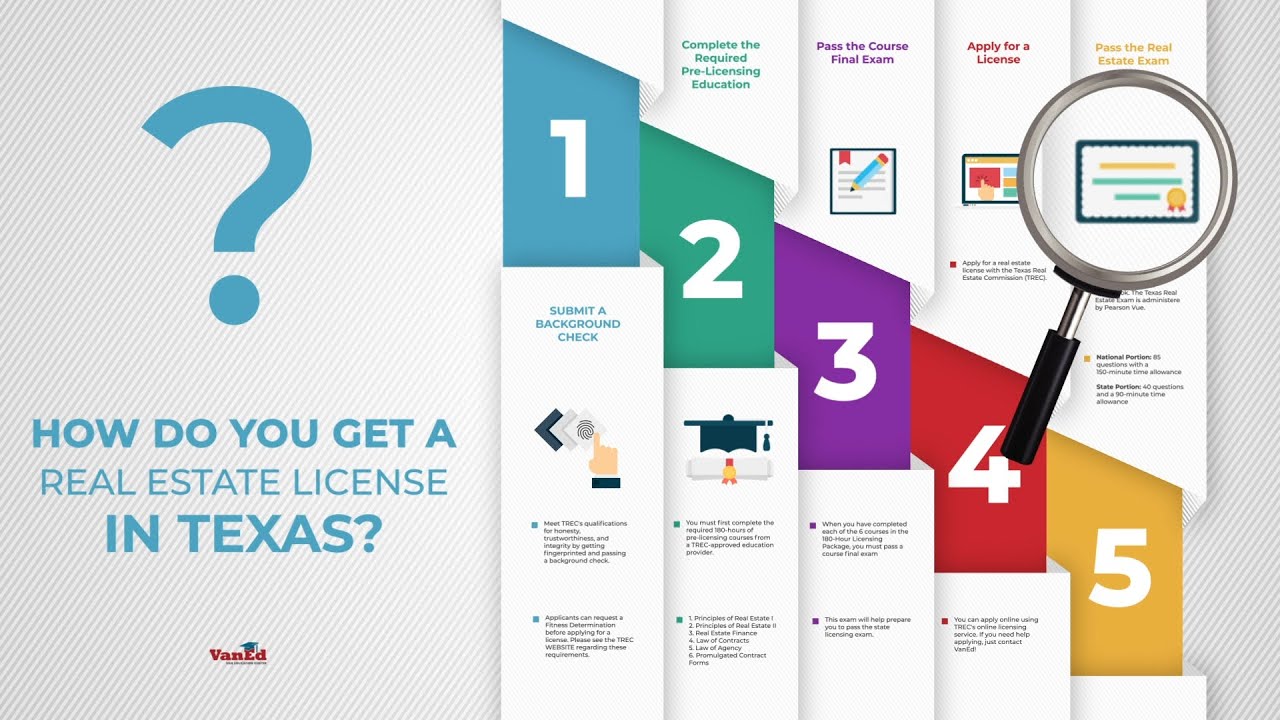
If you are interested to become a real-estate agent, you should consider taking a course to help you achieve your goals. You have many choices for real estate courses and they are offered at many schools. The best option is to find a school that offers flexible and practical classes. These classes will provide all the information that you need to become a real estate agent.
No matter whether you want to enroll in a traditional classroom course, or take your courses online you must complete a pre-licensing program. This course is designed to prepare you for the real estate license exam. In order to pass, you must score at least 75%. You will receive your test results immediately after taking the exam. To practice further, you may retake your exam. Many online courses offer study materials and guides that can help you prepare for licensing exams.

Before you register for a course make sure it is state-approved. There are many courses you can choose between, such as courses for real agents and brokers, continuing education courses, or courses for real property agents. Each course will require a minimum of 60 credit hours. Many states require you to complete at least 60 hours of coursework, while others allow you to take up to 90 hours. A written test is required to obtain a broker's license.
The Real Estate License Online Course and Prep Agent Pre-License Online Course are just a few of the courses that you can take. Prep Agent Pre-License will give you a guarantee of a pass if you don't succeed. All reading materials will be available in PDF/EPUB eBook format. This course will provide a comprehensive understanding of the industry, as well the laws that govern it.
Prep Agent Prelicense will teach you everything you need to pass your real estate license exam. This course will teach how to use contracts, agency relationships, or agency benefits.
You can also choose to take a course online, as long as it is offered by an accredited school. Many public universities and community college offer real estate courses. The school can charge anywhere from $250 up to $300 for these courses. The Real Estate License Online Course, for example, allows you to complete your coursework in six months. You will be issued a certificate at the end of the course. You can also access the online student dashboard and see your progress. The course can be completed at your own pace depending on how busy you are. It is recommended that an online course be signed up that is customized to your needs.

In order to become a real estate broker in Connecticut, you must complete at least 12 hours of continuing education every two years. Each cycle has a different number of elective credits hours. For the course requirement, you can count up 15 hours of course content from your bachelor's degree.
FAQ
What are some of the disadvantages of a fixed mortgage rate?
Fixed-rate loans tend to carry higher initial costs than adjustable-rate mortgages. Additionally, if you decide not to sell your home by the end of the term you could lose a substantial amount due to the difference between your sale price and the outstanding balance.
How many times do I have to refinance my loan?
This depends on whether you are refinancing with another lender or using a mortgage broker. In either case, you can usually refinance once every five years.
What amount of money can I get for my house?
This can vary greatly depending on many factors like the condition of your house and how long it's been on the market. According to Zillow.com, the average home selling price in the US is $203,000 This
Statistics
- Based on your credit scores and other financial details, your lender offers you a 3.5% interest rate on loan. (investopedia.com)
- When it came to buying a home in 2015, experts predicted that mortgage rates would surpass five percent, yet interest rates remained below four percent. (fortunebuilders.com)
- Over the past year, mortgage rates have hovered between 3.9 and 4.5 percent—a less significant increase. (fortunebuilders.com)
- The FHA sets its desirable debt-to-income ratio at 43%. (fortunebuilders.com)
- This seems to be a more popular trend as the U.S. Census Bureau reports the homeownership rate was around 65% last year. (fortunebuilders.com)
External Links
How To
How to Manage a Property Rental
Although renting your home is a great way of making extra money, there are many things you should consider before you make a decision. These tips will help you manage your rental property and show you the things to consider before renting your home.
Here are the basics to help you start thinking about renting out a home.
-
What do I need to consider first? Before you decide if your house should be rented out, you need to examine your finances. If you are in debt, such as mortgage or credit card payments, it may be difficult to pay another person to live in your home while on vacation. Also, you should review your budget to see if there is enough money to pay your monthly expenses (rent and utilities, insurance, etc. It might not be worth the effort.
-
How much does it cost to rent my home? There are many factors that go into the calculation of how much you can charge to let your home. These include factors such as location, size, condition, and season. Prices vary depending on where you live so it's important that you don't expect the same rates everywhere. Rightmove has found that the average rent price for a London one-bedroom apartment is PS1,400 per mo. This would translate into a total of PS2,800 per calendar year if you rented your entire home. This is a good amount, but you might make significantly less if you let only a portion of your home.
-
Is it worth the risk? It's always risky to try something new. But if it gives you extra income, why not? It is important to understand your rights and responsibilities before signing anything. Your home will be your own private sanctuary. However, renting your home means you won't have to spend as much time with your family. Make sure you've thought through these issues carefully before signing up!
-
Are there any advantages? It's clear that renting out your home is expensive. But, you want to look at the potential benefits. There are plenty of reasons to rent out your home: you could use the money to pay off debt, invest in a holiday, save for a rainy day, or simply enjoy having a break from your everyday life. You will likely find it more enjoyable than working every day. Renting could be a full-time career if you plan properly.
-
How do I find tenants? Once you've decided that you want to rent out, you'll need to advertise your property properly. You can start by listing your property online on websites such as Rightmove and Zoopla. Once potential tenants reach out to you, schedule an interview. This will help you assess their suitability and ensure they're financially stable enough to move into your home.
-
How do I ensure I am covered? You should make sure your home is fully insured against theft, fire, and damage. You will need insurance for your home. This can be done through your landlord directly or with an agent. Your landlord will likely require you to add them on as additional insured. This is to ensure that your property is covered for any damages you cause. However, this doesn't apply if you're living abroad or if your landlord isn't registered with UK insurers. In such cases, you will need to register for an international insurance company.
-
Sometimes it can feel as though you don’t have the money to spend all day looking at tenants, especially if there are no other jobs. But it's crucial that you put your best foot forward when advertising your property. Make sure you have a professional looking website. Also, make sure to post your ads online. It is also necessary to create a complete application form and give references. While some people prefer to handle everything themselves, others hire agents who can take care of most of the legwork. Either way, you'll need to be prepared to answer questions during interviews.
-
What happens after I find my tenant?After you've found a suitable tenant, you'll need to agree on terms. If there is a lease, you will need to inform the tenant about any changes such as moving dates. Otherwise, you can negotiate the length of stay, deposit, and other details. Keep in mind that you will still be responsible for paying utilities and other costs once your tenancy ends.
-
How do you collect the rent? When the time comes to collect the rent, you'll need to check whether your tenant has paid up. If your tenant has not paid, you will need to remind them. You can deduct any outstanding payments from future rents before sending them a final bill. If you're having difficulty getting hold of your tenant you can always call police. They will not usually evict someone unless they have a breached the contract. But, they can issue a warrant if necessary.
-
What can I do to avoid problems? While renting out your home can be lucrative, it's important to keep yourself safe. Ensure you install smoke alarms and carbon monoxide detectors and consider installing security cameras. Make sure your neighbors have given you permission to leave your property unlocked overnight and that you have enough insurance. Do not let strangers in your home, even though they may be moving in next to you.